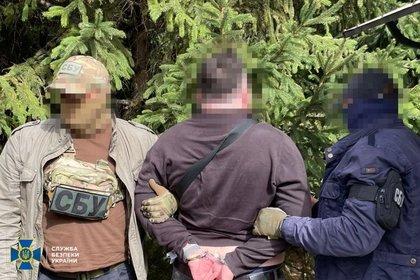The Security Service of Ukraine (SBU), alongside the National Police, have arrested six suspects involved in two draft evasion schemes in Kyiv and Kherson respectively.
The SBU said the suspects included lawyers and staff from Ukraine’s territorial recruitment centers (TRC) tasked by the government to mobilize conscription-age males. The SBU did not specify the dates of the arrests.
JOIN US ON TELEGRAM
Follow our coverage of the war on the @Kyivpost_official.
The SBU’s press release on Thursday, Oct. 10 said two lawyers were arrested in Kyiv for “[offering] conscripts to hide from mobilization due to illegal employment at one of the state-owned defense enterprises” after falsifying their medical records using the lawyers’ own connections.
“Initially, those involved organized for their clients a formal examination of the military medical commission [VLK] and ‘accompanied’ the documents to the TRC in order to avoid the procedure of serving a summons.
“For this, the lawyers used personal connections in the VLK and military commissars of the capital,” read the press release, adding that one suspect was caught red-handed while receiving money for his service, with his accomplice being arrested in Cherkasy.
In Kherson, three TRC employees and an accomplice at a local administrative services center were arrested.
The accomplice was said to have offered the service while updating the military registration, which she then forwarded to the TRC employees for them to remove the names on fictitious health grounds.

Brace for 2028: EU Urged to Prepare for Potential Russian Aggression
The suspects allegedly offered the service for $7,000 to $12,000 per conscript. All of them face up to 10 years in prison with confiscation of property if convicted.
Longstanding issues with TRCs
Ukrainians have long questioned the effectiveness and legitimacy of the TRCs, which have been implicated in a series of scandals that have shaken locals’ trust in the mobilization drive.
On the one hand, TRC employees have been accused of corruption – as in the latest case – a situation that has seen only a little improvement after President Volodymyr Zelensky’s decision to sack all TRC heads in August 2023 in a bid to restore public trust.
While it cannot be said that corruption is a systematic issue among the TRCs, it’s fair to say the cases are not isolated – in March, similar schemes were uncovered in Ukraine’s Khmelnytsky region; in May, Ukraine’s National Agency for the Prevention of Corruption (NAPC) identified corruption offenses in 8 out of 541 officials after auditing a third of all TRC officials.
Corruption aside, the TRC’s occasional heavy-handed approach to recruitment did not sit well with locals.
In April, TRC employees reportedly kidnapped a 14-year-old teenager in a minibus in the Odesa region, en route to the recruitment office, and subsequently dropped him off several kilometers away after learning of his age. In May, the Ukrainian National Bar Association reported that a lawyer was forcibly taken to the TRC while providing free legal aid in criminal proceedings.
Nick, a conscript-age male Kyiv Post interviewed in April before Ukraine introduced its updated mobilization law, summarized his views on the TRC as follows:
“The recruitment centers and their representatives often outsource local thugs to do the dirty work. And those guys can simply beat the dude [who’s] refusing to go with them. They can simply stop the bus and deliver all males [on] it to the recruitment center. When I see that my patriotism fades away without a trace,” he told Kyiv Post at the time.
Potential shift in mobilization approach
Given such precedents, Ukraine appears to be weighing options to reduce its reliance on the TRCs to entice more locals to join the military.
On Oct. 1, the Cabinet of Ministers allowed military units to directly issue a referral for volunteers to the medical commission should Ukrainians wish to serve in a certain unit.
The changes essentially bypassed the TRC, where previous procedures required volunteers to still visit the TRC with a referral letter from the desired unit, which was sometimes ignored.
Oleksandr Okhrimenko, commander of the 72nd Separate Mechanized Brigade, praised the decision.
“We can assure civilians who want to serve in one or another position in our brigade that they will get into the unit they chose. Because until now there have been problems with this.
“There are cases when people who agreed to serve in training centers with the leadership of their chosen units, for a number of different reasons, after training in training centers, they do not get into ‘their’ units,” Okhrimenko told Glavcom in an interview.
The latest decision coincided with Nick’s vision in April.
“Examples of 3rd Separate Assault Brigade show that recruitment, unlike the violent mobilization, [works], and [works] great. There [are] a lot of folks around willing to fight Russians directly, and they are willingly going to the local brigade’s recruiters,” he told Kyiv Post at the time.
In another important move, Ukraine’s parliament also banned the mobilization of persons under 25 years old – though lawmaker Oleksiy Honcharenko said the decision has yet to include a clause on demobilization for those below 25, a notion that saw heated debate when Ukraine introduced a new mobilization law in May.
Ukraine’s mobilization law has been criticized in Ukraine as punishment-oriented rather than incentive-driven, but the latest decisions have demonstrated a push for more incentives for locals to help defend the nation.
Meanwhile, observers in countries supporting Ukraine have often questioned Kyiv’s reluctance to draft younger men, especially since the average age of Ukrainian soldiers is 40, though Ukraine is likely attempting to preserve the younger generation in fear of a post-war demographic crisis.
As the war continues grinding on well into its third year and the horrors of war becoming a discernible reality, whether the changes can help Ukraine boost its ranks remains to be seen.
You can also highlight the text and press Ctrl + Enter










